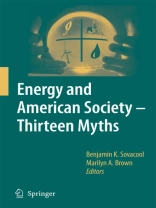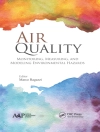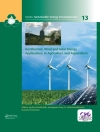Current events related to energy policy – skyrocketing gasoline prices, the 2003 Northeast Blackout, the Kyoto Protocol’s enactment, passage of the Energy Policy Act of 2005, and the influence of recent Gulf Coast hurricanes on energy supplies and prices – demand innovative approaches towards conceptualizing the relationship between energy and American society.
This book takes on a central quandary in the study of energy and environmental policy: What myths continue to exist in American culture concerning energy, the environment, and society? It enrolls twenty-four of the nation’s top experts working on energy policy in industry, government laboratories, utilities, nonprofit organizations, and universities to debunk and contextualize thirteen energy myths relating to electric power, renewable energy, energy efficiency, transportation, and climate change.
While the book focuses on the American experience, it will be of interest to those working in the fields of energy policy, energy and the environment, and technology assessment worldwide.
‘This is a brilliant, bold, and fascinating book …that should be read by anybody even remotely concerned about energy, the environment, or the future of American society.’
Art Rosenfeld, Commissioner, California Energy Commission and recipient of the 2006 Enrico Fermi Award
‘…This work is a must-read for anyone interested in American energypolicy.’
Kateri Callahan, President, Alliance to Save Energy
‘…By collecting the best minds to debunk the greatest of these myths, Sovacool and Brown have brought us a step closer to finding a national energy policy based on common sense.’
Chris Cooper, Executive Director, Network for New Energy Choices
‘… Sovacool and Brown provide a bold and imaginative way forward.’
John A. ‘Skip’ Laitner, Visiting Fellow and Senior Economist, American Council for an Energy-Efficient Economy
Содержание
– The Compelling Tangle of Energy and American Society.- Energy Myth one – Today’s Energy Crisis is “Hype”.- Energy Myth Two – The Public is Well Informed About Energy.- Energy Myth Three – High Land Requirements and an Unfavorable Energy Balance Preclude Biomass Ethanol from Playing a Large Role in Providing Energy Services.- Energy Myth Four – The Hydrogen Economy Is A Panacea To The Nation’s Energy Problems.- Energy Myth Five – Price Signals are Insufficient to Induce Efficient Energy Investments.- Energy Myth Six – The Barriers to New and Innovative Energy Technologies are Primarily Technical: The Case of Distributed Generation (DG).- Energy Myth Seven – Renewable Energy Systems Could Never Meet Growing Electricity Demand in America.- Energy Myth Eight – Worldwide Power Systems are Economically and Environmentally Optimal.- Energy Myth Nine – Energy Efficiency Improvements have Already Reached Their Potential$1$.- Energy Myth Ten – Energy Efficiency Measures are Unreliable, Unpredictable, and Unenforceable.- Energy Myth Eleven – Energy R&D Investment Takes Decades to Reach the Market.- Energy Myth Twelve – Climate Policy Will Bankrupt the U.S. Economy.- Energy Myth Thirteen — Developing Countries are not Doing Their Part in Responding to Concerns About Climate Change.- Conclusions — Replacing Myths With Maxims: Rethinking The Relationship Between Energy And American Society.
Об авторе
Dr. Benjamin K. Sovacool is a Eugene P. Wigner Post-doctoral Fellow in Science Policy at the Oak Ridge National Laboratory in Oak Ridge, TN. Previously, Dr. Sovacool served as a research analyst for the Consortium on Energy Restructuring, where he worked on a grant from the National Science Foundation’s Electric Power Networks Efficiency and Security Program investigating the social and legal impediments to renewable energy systems. He is also a former Senior Research Fellow at the Virginia Center for Coal and Energy Research in Blacksburg, Virginia, where he assessed renewable energy potential for the state of Virginia.
Dr. Marilyn A. Brown is Chair of Energy Policy in the School of Public Policy at the Georgia Institute of Technology and a Distinguished Visiting Scientist at Oak Ridge National Laboratory. Dr. Brown is an internationally recognized expert on issues surrounding the commercialization of new energy and environmental technologies and the evaluation of government programs and policies. She has authored more than 150 publications and has been an expert witness in hearings before Committees of both the U.S. House of Representatives and the U.S. Senate. She is also a member of the National Commission on Energy Policy and the National Academies Board on Energy and Environmental Systems, and is a Certified Energy Manager.












